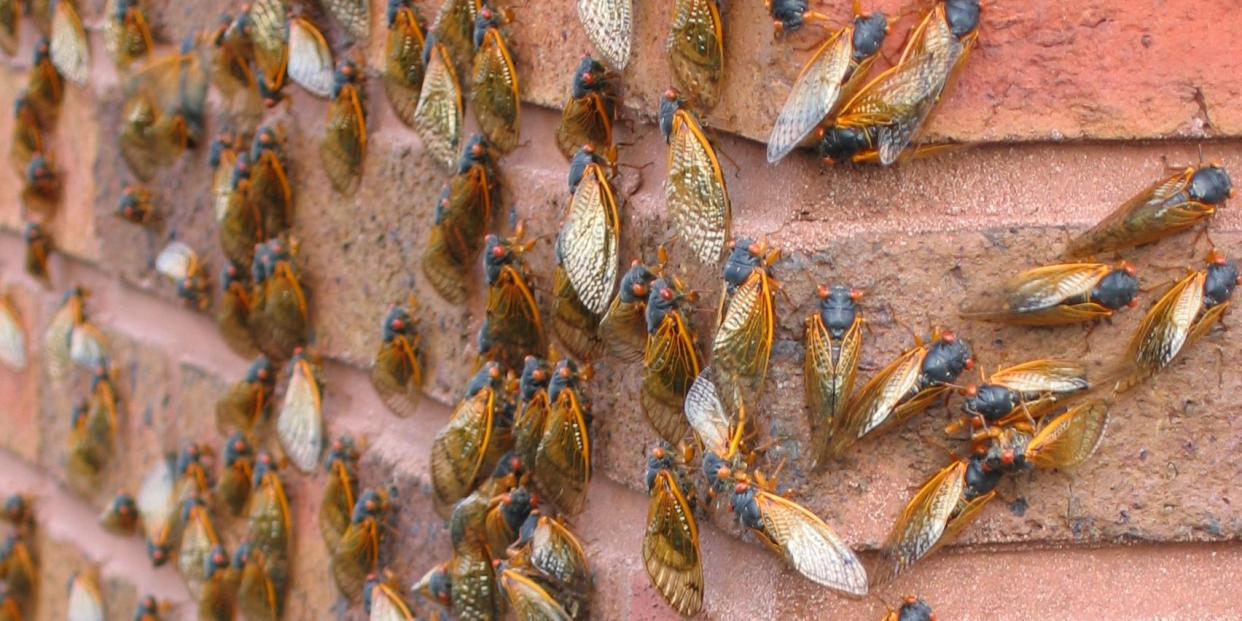When Will the Cicadas Go Away? Here’s How Long They’re Expected to Stick Around

After months of anticipation, Brood X is finally here. This swarm of noisy periodical cicadas is slowly emerging across the northeastern U.S. Hilarious commentary (and incredible videos!) of the bulbous-eyed bugs are already showing up all over social media.
Cicadas are usually classified into one of two groups: Annual cicadas, which come out each year, and periodical cicadas, which emerge from the ground every 13 to 17 years. Cicadas start as eggs laid in trees. After hatching, they fall out of the trees and burrow into the ground. There, they feed on fluids from tree roots and grow slowly. When the soil warms up, they emerge as adult cicadas.
Brood X is a group of 17-year cicadas that made their last appearance in 2004. It’s expected that millions of these bugs will be emerging—and it’s a pretty amazing thing to witness. But if you live in cicada territory, you’re probably already annoyed with all the noise and shells they leave behind. So, asking for a friend: When will the cicadas finally go away? We asked insect experts weigh in.
When will the cicadas go away?
Cicadas don’t live forever. In fact, periodical cicadas usually only survive above ground as adults for two to six weeks before they die off, says Chad Gore, Ph.D., an entomologist and market technical director for Ehrlich Pest Control.
The weather also plays a factor, according to Timothy Best, board-certified entomologist and technical manager for Terminix. “The warmer it is, and the drier it is, the sooner these insects will complete their reproductive cycle and the adults will expire,” he explains.
In terms of Brood X, “by the beginning of July, we can probably expect most of them to be gone,” Gore says.
Annual cicadas are on a slightly different timeline, though. They’ll emerge in July and August, “with singing about two weeks later,” Gore says. There can be some overlap between the different types of cicadas, with some annual cicadas emerging as early as June. Those annual adults will usually die off five to six weeks after they’ve emerged. “They’ll be gone by the time fall arrives,” Gore says.
For the latest health news, join Prevention Premium to gain exclusive access to expert-backed wellness content you can trust.
There’s not one specific date where the cicadas will all drop dead, though: It will happen gradually over a period of a few weeks, adds Frank Meek, technical services manager at Rollins. “The females are going to start dying off after they lay the eggs,” he says.
The cicada eggs will go through the life cycle all over again, with annual cicadas re-emerging next year, and Brood X members resurfacing in 2038.
What will the aftermath of the cicadas look like?
There are a few potential things you’ll spot. First, you may see empty shells from the cicadas around tree trunks and other structures as the nymphs (teenage cicadas) molt into their adult forms. And, yes, you may see some cicada bodies lying around. There will be “lots of dead cicadas, like millions of them,” says Howard Russell, M.S., an entomologist at Michigan State University.
Well, until predators eat them. “Cicadas are a great source of protein,” Meek says. “Ants will eat them, birds will take some out, and so will snakes and rodents. Their bodies will be broken down relatively quickly.”
You probably won’t be tripping over dead cicada bodies, though. “Many will largely be out of sight and out of mind to most folks, as they will likely be in grasses around tree trunks,” Best says. You may see some dead cicadas in your driveway, walkway, and in other areas around your home, but you can easily remove them with a broom or leaf blower. “For those adventurous types or home gardeners, cicadas can make excellent compost as their exoskeletons are super rich in nitrogen,” Best says.
You might also notice a lot of holes in the ground where the cicada nymphs emerged. “This, however, can also be beneficial as it aerates the soil and helps the growth of grass under the tree canopy,” Gore says. The holes will close over time.
And, unfortunately, you may notice some dead tree branches. “The branch tips of trees where the females laid their eggs will die,” Russell says.
Some folks will also be happier than they’ve been in weeks. “People who endured their noise and lusty behavior will be grateful they’re all dead,” Russell says.
If you’re ready for the cicadas and their deafening sounds to leave, Gore recommends trying to pivot your thinking about them. “Record the sounds of the cicadas,” he suggests. “One day the annoyance you experienced from the sound will fade and you may actually look back fondly on this amazing natural phenomenon.”
You Might Also Like

